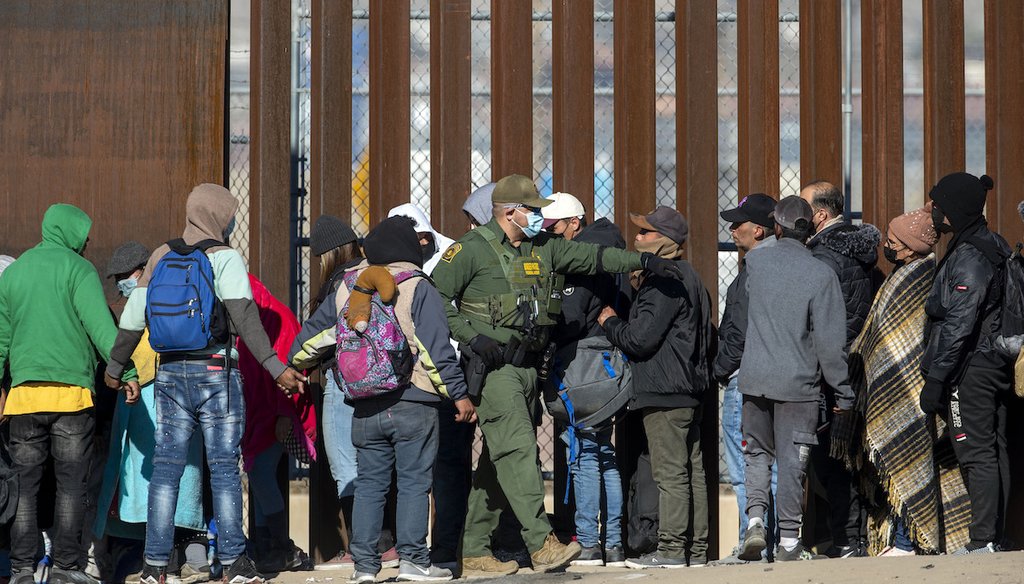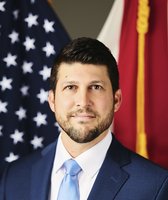Stand up for the facts!
Our only agenda is to publish the truth so you can be an informed participant in democracy.
We need your help.
I would like to contribute

A Border Patrol agent checks the line formed by migrants before letting a group enter into El Paso, Texas from Ciudad Juarez, Mexico, on Dec. 21, 2022. (AP)
If Your Time is short
-
“Operational control” is a legal term defined by Congress in 2006. Under the law, the government must prevent all illegal entries into the U.S., including people and drugs.
-
No administration has achieved operational control of the border, and experts say it’s an unreachable goal.
-
Although many immigrants pay smugglers to cross the border, experts said to characterize that as cartels having “operational control” would be inaccurate.
During the 2023 Conservative Political Action Conference, two Republican House representatives claimed that cartels control the United States’ southern border.
In one panel, moderator Todd Starnes asked Rep. Scott Perry, R-Pa., to describe the situation at the southern border.
"The cartels are running the border," Perry said March 2. "The cartels have operational control of the United States-Mexico border."
Rep. Mark Green, R-Tenn., the chairman of the House’s Homeland Security committee, repeated the claim during another panel that day about border security.
"The drug cartels have operational control of our southern border," Green said.
Green’s office did not respond to our request for comment. Perry’s campaign team pointed PolitiFact to written testimony from Brandon Judd, the National Border Patrol Council union president. The union represents about 16,000 Border Patrol agents and support personnel.
"Each and every day along the entirety of our southwest border, criminal cartels dictate when, where and how illegal border crossers enter our country," Judd told the House Oversight Committee on Feb. 15.
Perry’s team said "this is operational control."
But that’s an exaggeration and disregards immigration authorities’ enforcement actions, experts said.
DHS did not respond on the record to our request for comment.
‘Operational control’ is a legal term defined by Congress
The term "operational control" refers to the Department of Homeland Security’s ability to stop illegal entries — of people and contraband — into the U.S., according to the 2006 Secure Fence Act. That law said that to have operational control of U.S. borders, DHS must prevent "all unlawful entries into the United States, including entries by terrorists, other unlawful aliens, instruments of terrorism, narcotics, and other contraband."
By that definition, no administration has ever achieved operational control of the border. Immigrants and illicit drugs have entered the U.S. illegally since the law’s enactment. The human rights advocacy nonprofit Washington Office of Latin America described the definition as "a tremendously unrealistic standard" in a 2015 analysis.
Although the government has not achieved operational control as defined, it would be inaccurate to say the cartels have achieved it.
Cartels are transnational crime organizations and engage in both drug trafficking and human smuggling across the border. Mexican drug trafficking organizations pose the greatest drug trafficking threat to the U.S., according to the Drug Enforcement Administration.
Michelle Mittelstadt, communications director at the nonpartisan Migration Policy Institute, said cartels would need to have "100% ability" to smuggle people, drugs and other illicit contraband across the border "at any time and place of their choosing" to achieve operational control.
"We know that is not the case," Mittelstadt said, citing U.S. Customs and Border Protection’s fiscal year 2022 enforcement actions.
Border Patrol agents at the southern border have expelled immigrants at least 2.1 million times under the Biden administration. Agents have seized nearly 170,000 pounds of drugs at the border in fiscal year 2023, which began in October. Drugs seized include fentanyl, marijuana and cocaine.
Cartels’ smuggling does not amount to ‘operational control,’ experts say
A 2020 DHS report, which covered border metrics during the Trump administration, said that about 80% to 95% of immigrants apprehended at the southern border used smugglers. That was driven partly by transnational criminal organizations controlling crossing points along the Mexican side of the border, the report said.
However, that doesn’t mean that cartels are able to get everyone or everything into the country, experts said.
"Criminal organizations in Mexico have pervasive control over crossing in Mexico," said David Bier, associate director of immigration studies at the Cato Institute, a libertarian think tank. But "it certainly doesn’t rise to the level of being able to control all entries."
Drugs, like fentanyl, are coming into the U.S. through the border "not because the cartels have control of the border," but "because it is easy to smuggle," said Tony Payan, director of the Center for the United States and Mexico at Rice University’s Baker Institute for Public Policy.
Fentanyl is compact, said Sanho Tree, a drug policy expert at the Institute for Policy Studies, and therefore easier for cartels to smuggle the drug in through ports of entry and using drones. Tree also said drugs can be passed across barriers at the southern border that have small openings.
The idea that the government could control every drug that enters the U.S. is "an absurd assumption," Tree said.
The government has been trying to control drugs entering the U.S. for decades, and has been unsuccessful at seizing all of them, including marijuana and heroin.
"In my view, no one controls the border. It is a complex space, with many different actors, and many different interests," Payan said.
Our Sources
Phone interview, Sanho Tree, project director of drug policy at the Institute for Policy Studies, March 2, 2023
Email exchange, Tony Payan, director of the Center for the United States and Mexico at Rice University’s Baker Institute for Public Policy, March 2, 2023
Email exchange, Michelle Mittelstadt, director of communications at the Migration Policy Institute, March 2, 2023
Email exchange, David J. Bier, associate director of immigration studies at the Cato Institute, March 2, 2023
Email exchange, Matt Beynon, spokesperson for Rep. Scott Perry, March 2, 2023
YouTube, LIVE: CPAC 2023 in Washington—March 2, March 2, 2023
YouTube, CPAC LIVE From Washington, DC - Day One - 3/2/2023, March 2, 2023
Congress, Secure Fence Act of 2006, Oct. 26, 2006
WOLA, Fact Check: is Total ‘Operational Control’ at the Border a Realistic Goal?, Jan. 23, 2015
PolitiFact, Chip Roy cites correct border encounters data, but is wrong about most staying indefinitely, Feb. 3, 2023
U.S. Customs and Border Protection, Drug Seizure Statistics FY2023, accessed March 3, 2023
U.S. Department of Homeland Security, Department of Homeland Security Border Security Metrics Report, Aug. 5, 2020
The New York Times, Smuggling Migrants at the Border Now a Billion-Dollar Business, July 25, 2022
































